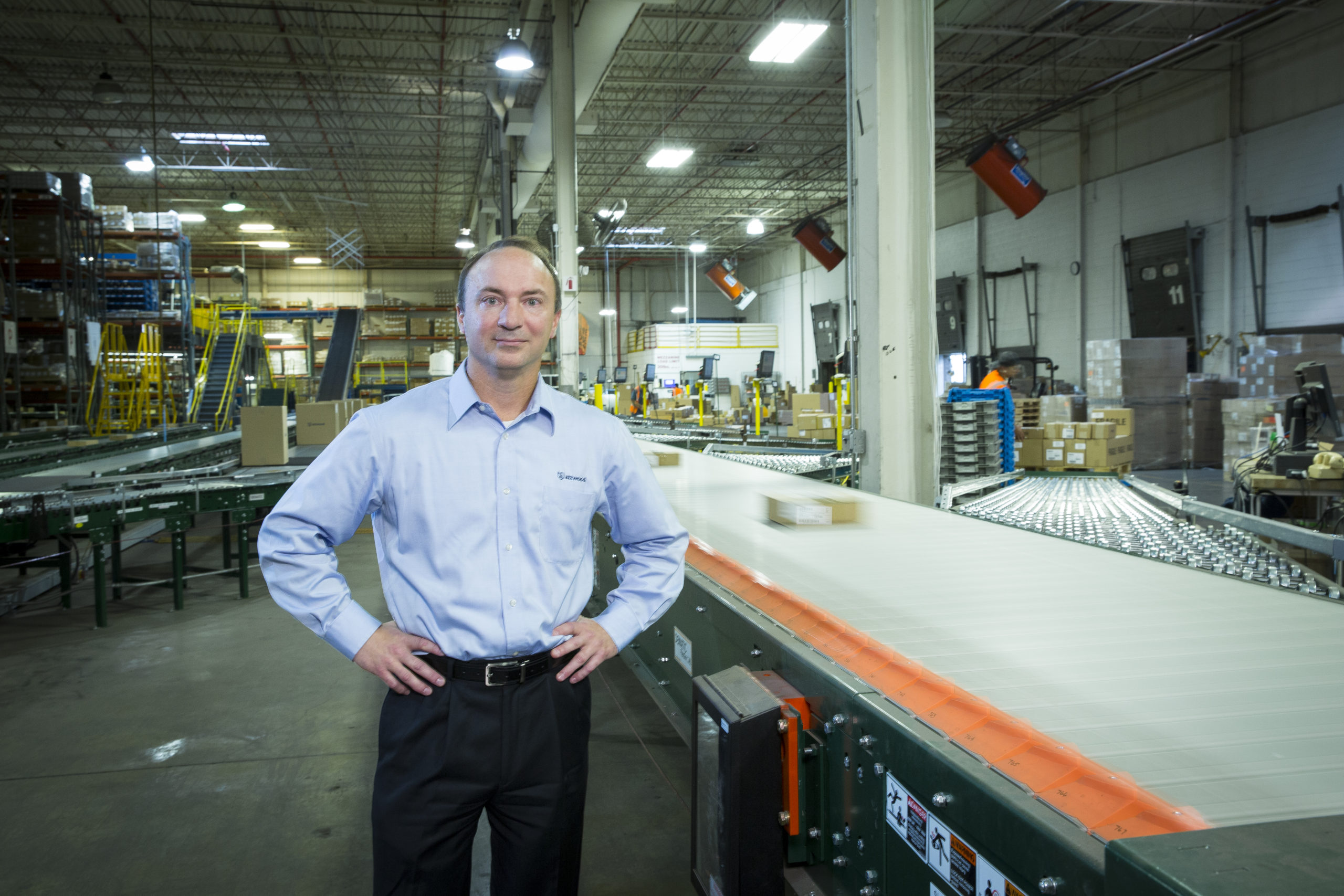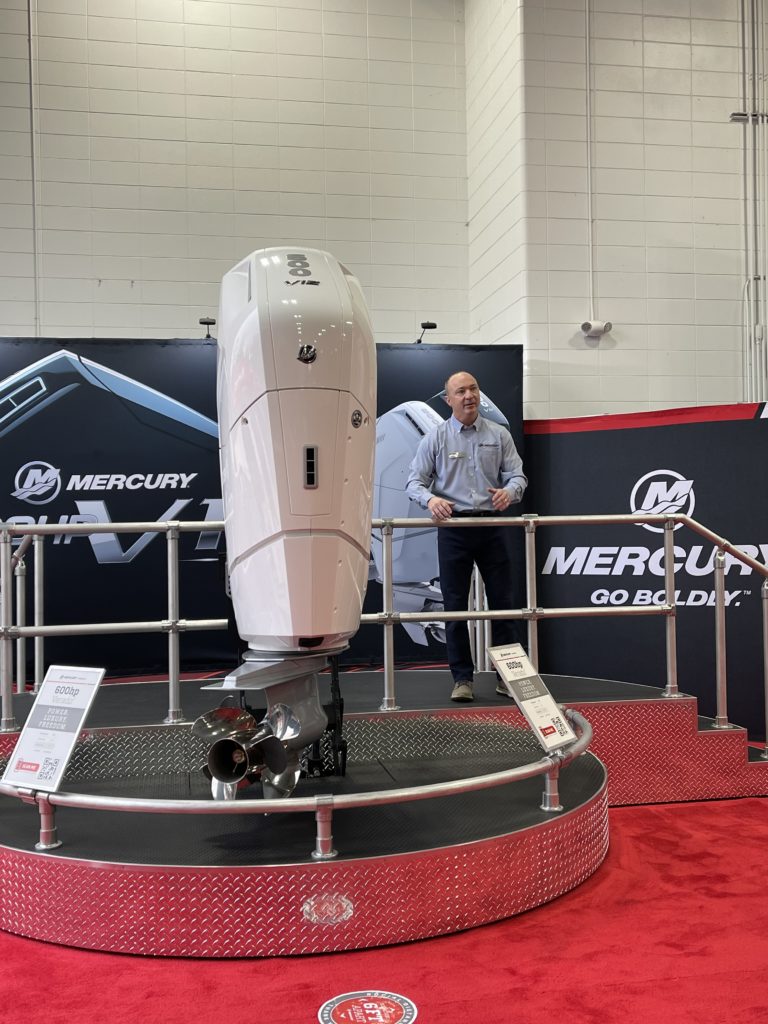Q&A with Mercury Marine’s Chris Drees

By Adam Quandt
Boating Industry was recently invited down to Mercury Marine’s famous Lake X, for an exclusive look at Mercury’s new 600hp V12 Verado outboard. Between test runs of the new engine on various boats, Boating Industry had the chance to catch up with Mercury Marine president Chris Drees.
BI: You’re two years in at the helm at Mercury now, tell us how it’s been.
CD: This is the most exciting time I can remember in the marine industry. If you think about what we started the year with — a lot of uncertainty with the economy and the coronavirus — the industry rebounded. What a great time to have people get out on the water, enjoy nature, spend time with their family. We’ve seen a big explosion in the industry and it’s carrying on through this year. Inventories are low in the field, more and more customers are looking to even repower or have new boats from what was purchased last year. I just see a bright future for the whole marine industry.
BI: You mentioned inventory in that. What’s your outlook for 2021 on inventory and being able to meet these new demands we’re seeing in the industry?
CD: On the Mercury side, we invested a lot into capacity. So, we have it all ramped up and we’re keeping up with demand as we speak. I think OEM builders on the boat side continue to increase capacity to meet that demand as well. However, I don’t think we’ll be totally caught up with filling that pipeline for another year, to even two years, if demand continues to be as it is.
BI: Along those lines, we’ve also seen a burst in used boat sales and you mentioned repower. What do you see as the future of the repower market for Mercury?
CD: The repower market is something we’re leaning into heavily. A lot of our new engine designs with a conventional midsection, made it a lot easier to repower with your mechanical throttle and shift. So, the V6, the V8 are perfect repower engines for the marketplace and we see that demand really exploding through the dealer network. And as boats — whether new or used — get more scarce, consumers are saying “let me just repower and upgrade my motor to get better performance out of the boat.”
BI: We’ve seen this inventory burst likely heavily due to people not being able to do anything else, so when other options do come back, what are you doing at Mercury to help keep people on the water?
CD: People have been asking that question around quite a bit — do you think this is a bubble coming? — so, I want to address that first. Just think with the number of new boaters that entered into the market. It’s not only the new boaters, but also then their extended family and friends now get a chance to go out and boat and find what a great activity it is. We think this is a stepping-stone to even bring more people into the industry. Our job as a manufacturer — whether it’s boat or engine — is to make the product easy to use, intuitive and reliable. We think that’s what’s going to help keep people on the water and not worry so much about maintenance or bringing it into their dealership. That’s a key focus area for Mercury.
BI: Switching topics to talk about the relationship between manufacturer and dealer. How does Mercury work to be connected with its dealers?
CD: Dealers are critical for our entire industry, especially on the maintenance side. We have a significant amount of training programs and we’re investing in tools to help dealers diagnose and fix our engines much more quickly. Secondarily, we want to be sure we build things more reliable. Dealers are really a critical piece to our infrastructure and continue our investment to make their job easier with the end consumer is what we’re trying to do.
BI: So 2020 has been an interesting year, to say the least. How do you reach customers now during a time of distance? What are you doing to ensure the Mercury brand stays in front of customers still, without boat shows and things along those lines?
CD: For us, it’s been an expansion of our digital platform and digital marketing in particular. Our social media following has doubled over the last year and we see many more people using our upgraded website to research products. So now, especially during the pandemic, the digital presence and how you portray your products is extremely important. And that goes for boat shows too. There have been some successful digital and virtual boat shows that have happened. I don’t think it will replace the need for boat shows all together, but I think it’s another tool for dealers and/or OEMs to allow people to experience the product in a much easier way.
BI: Obviously, we’re here for the new V12 outboard, so let’s switch gears and talk about it. You said it was a five-year project, what got Mercury here and what do you see this engine doing to the market?
CD: Oh, it’s just incredible. I give our team a lot of credit for listening to the consumers, the people that use it every day and some of the things they wanted to see in a motor. One, boats are getting bigger, so they certainly wanted more power and displacement on the back to get those on plane quicker. Second, it’s the NVH (Noise Vibration Harshness). They want to talk, especially at the back of the boat, and have a great, luxury experience. This is the quietest outboard we’ve ever built. Going into it, to get out of the hole quickly, we implemented industry’s first two-speed transmission; 20% lower first gear, pops out of the hole incredibly well and then with the second gear it allows you to cruise at a much faster speed to optimize fuel economy. For cruising, fishing, you name it, this engine is versatile and we think it’s going to be a homerun.
BI: Is there still a horsepower race in the industry, or do you see the focus shifting to different things?
CD: Well, I think from Mercury’s standpoint, we look at what the market is demanding. So, I don’t think it’s a race, it’s meeting consumer demand and builder’s demands out in the marketplace. It’s the consumer demand that driving the need for us to react to that demand with the appropriate power.
BI: With outboards, do you see weight as an issue anymore since we are looking at bigger and bigger boats? Is it really a thought in designing new and more powerful engines?
CD: Yeah, with Mercury it’s always a thought. We set strict weight targets on the engine to make sure it fits with the most applications that we can within the industry. So, whether it be our in-line V6, V8 and even our V12, the horsepower-to-weight ratio is always really good and important to us, not only from performance on the boat, but from a sustainability process — the less material we can use in the engine, the more efficient, better fuel economy we can drive.
BI: One thing I want to talk about briefly is electrification. It’s something we’re talking about more and more in the industry. How does Mercury play a role in electrification and what does that mean for the future of boating?
CD: Electrification is here and coming at us. Mercury is going to continue to be a leader in marine propulsion, whether it be internal combustion engines and/or electric outboards of the future. I think the first to convert are going to be the smaller horsepower engines. When you get to something with 600hp, when you marry up the largest Tesla battery, at wide-open throttle, it’d be 13 minutes of run time. So, it becomes not as feasible for the larger horsepower outboards to go electric, unless there’s a step change in battery technology.
BI: Along those same lines, what does Mercury’s relationship with its parent company Brunswick mean for the boat of the future?
CD: It’s going to be really interesting. Let’s look at it with Mercury engines in particular. We currently have a product called VesselView Mobile that we combine with a dealer portal, so any faults, any run-time information, a dealer has immediate access to that. So think about if you’re out on the water and you have a fault on your engine. If you’re logged in, a dealer can see that and potentially give you a call and say “hey, you’re ok for the day, bring it in, in a week” and just offer that peace of mind. So we think there are huge opportunities for us, connecting more so with the dealer and making sure that service process always goes well.
BI: Last final wrap-up question, I know you can only say so much, but what does the future hold for Mercury?
CD: Oh, we don’t talk about future plans, as you know, but our R&D has been in development of new programs continuously, so it will be a continuous stream of products that will be coming out. Not just “we just finished with the V12, we’re done.” There are more products in the pipeline.





